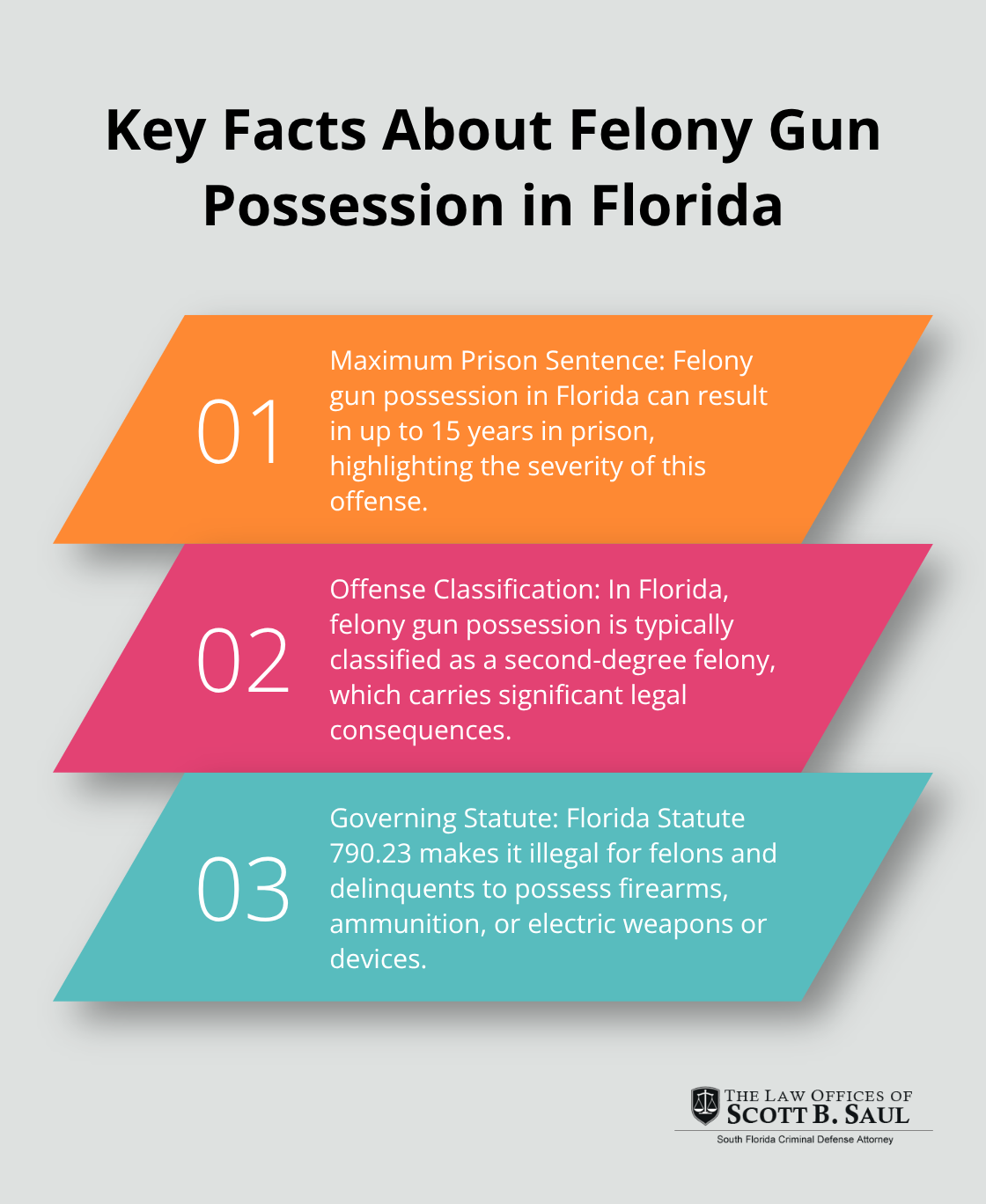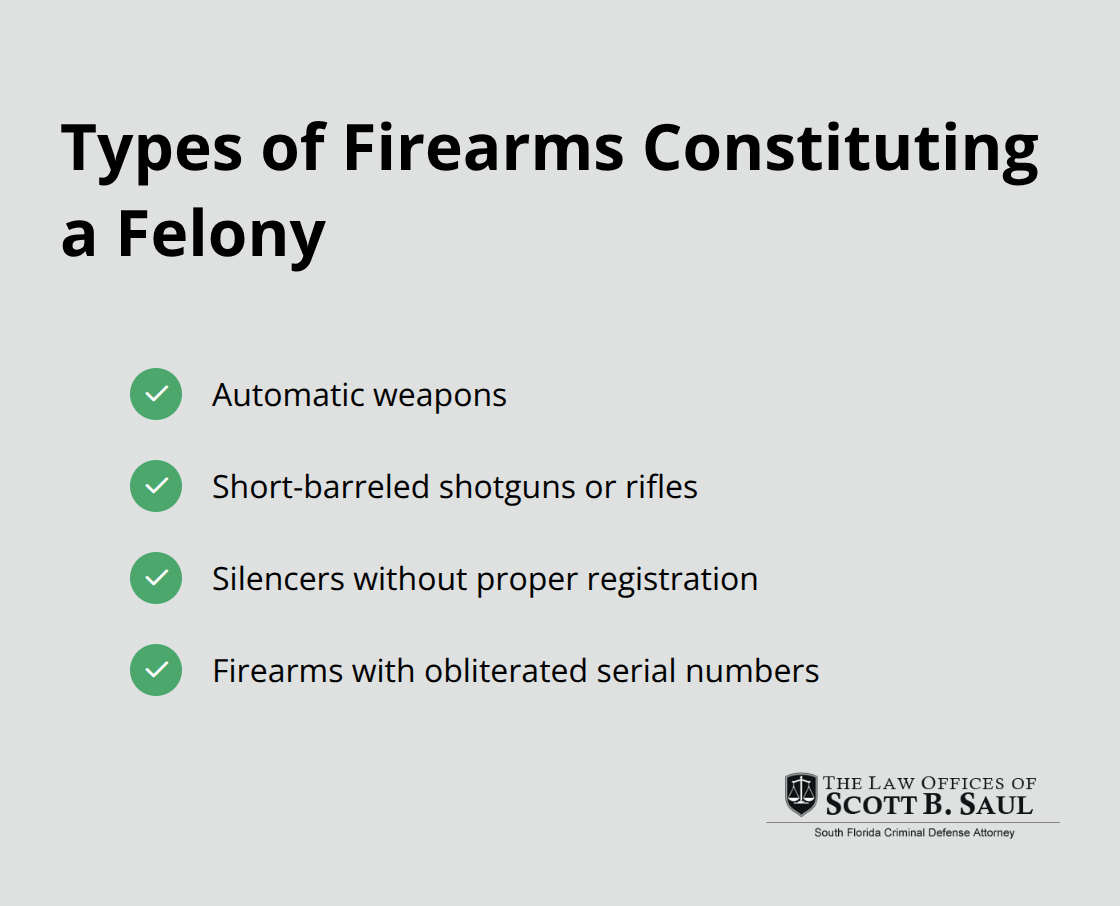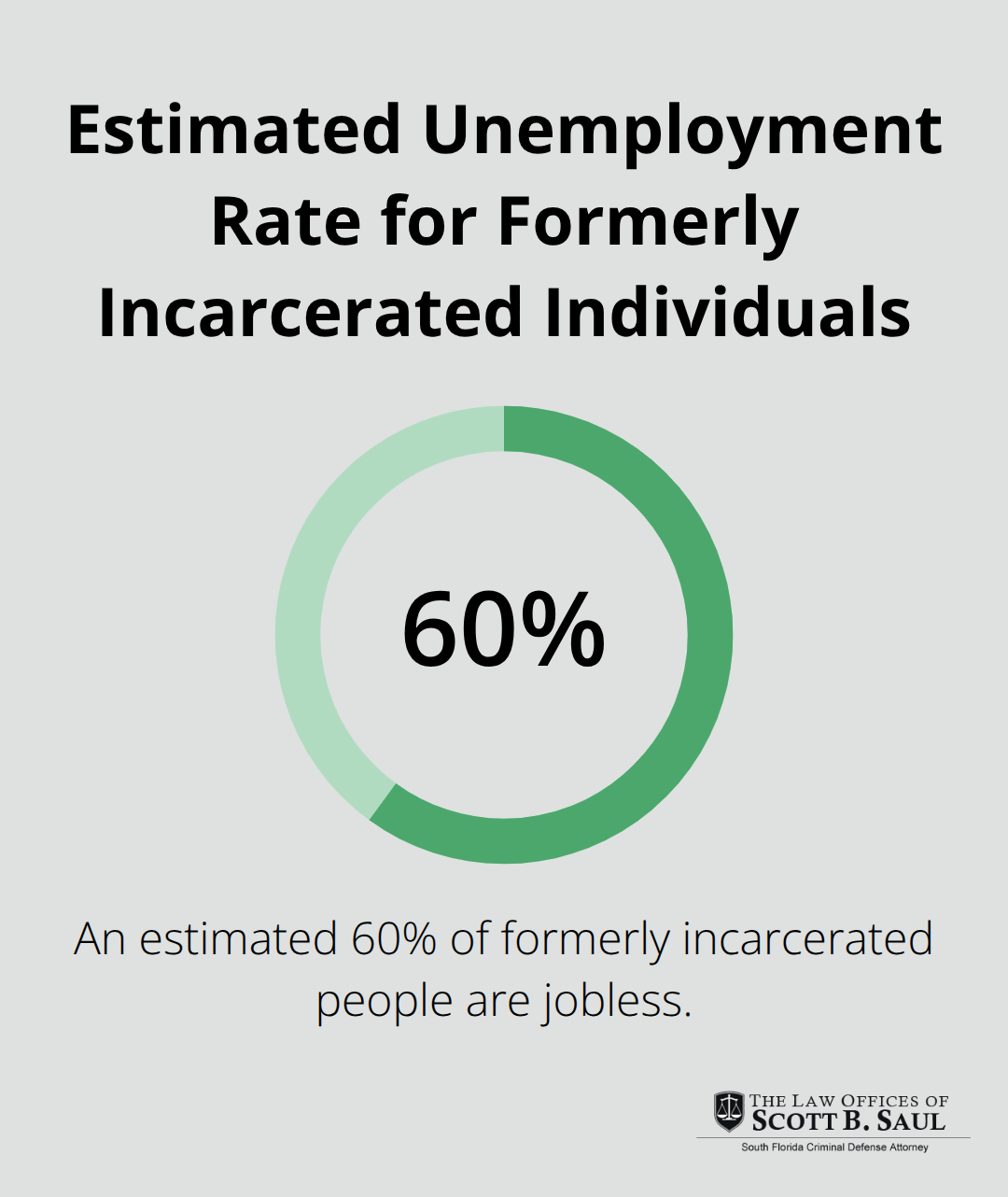What Is Felony Gun Possession and Its Consequences?
By : saulcrim | Category : Criminal Defense | Comments Off on What Is Felony Gun Possession and Its Consequences?
11th Sep 2025

At Law Offices of Scott B. Saul, we often encounter clients grappling with the question: What is felony gun possession? This serious offense can have life-altering consequences for those charged.
Understanding the intricacies of gun laws and the difference between misdemeanor and felony charges is vital for gun owners and non-owners alike. In this post, we’ll explore the definition, common scenarios, and potential legal ramifications of felony gun possession.
What Is Felony Gun Possession?
Federal Gun Laws
The Gun Control Act of 1968 sets the foundation for federal firearm regulations in the United States. This legislation regulated interstate and foreign commerce in firearms, including importation, “prohibited persons”, and licensing. Violations of these federal laws can result in felony charges, with potential penalties of up to 10 years in prison and substantial fines.
Florida’s Gun Laws
Florida maintains some of the most complex gun laws in the nation. The state has enacted specific statutes that outline legal firearm possession and its circumstances. For example, Florida Statute 790.23 makes it illegal for felons and delinquents to possess firearms, ammunition, or electric weapons or devices. This offense falls under the classification of a second-degree felony, which carries a punishment of up to 15 years in prison.

Misdemeanor vs. Felony Gun Charges
The line between misdemeanor and felony gun charges often depends on the offense circumstances and the individual’s criminal history. In Florida, carrying a concealed weapon without a proper permit typically constitutes a first-degree misdemeanor. However, the charge can escalate to a felony if the individual has prior convictions or carried the weapon while committing another crime.
Aggravating Factors
Several factors can transform a misdemeanor gun charge into a felony:
- Prior criminal convictions
- The type of firearm involved (e.g., automatic weapons or short-barreled shotguns)
- Location of possession (such as on school grounds or in government buildings)
- Intent to use the firearm in the commission of a crime
Consequences of Felony Gun Possession
A felony gun possession conviction carries consequences that extend far beyond potential prison time. These ramifications can affect various aspects of an individual’s life, including:
- Employment opportunities (many employers conduct background checks)
- Voting rights (felons may lose their right to vote in some states)
- Future firearm ownership (a felony conviction typically results in a lifetime ban on gun ownership)
- Housing options (landlords may deny housing to individuals with felony convictions)
The complexity of gun laws and the severe consequences of violations underscore the importance of understanding these regulations. Whether you’re a gun owner or not, knowledge of these laws can help you avoid unintentional infractions and protect your rights. In the next section, we’ll explore common scenarios that often lead to felony gun possession charges.
Common Scenarios That Lead to Felony Gun Charges
Felony gun possession charges stem from various situations, often catching individuals unaware. The Law Offices of Scott B. Saul has encountered numerous cases where people unknowingly violated gun laws, resulting in severe consequences. This chapter examines the most frequent scenarios that result in felony gun charges.
Convicted Felons and Firearm Possession
A straightforward path to a felony gun charge occurs when a person with a prior felony conviction possesses a firearm. Federal law prohibits convicted felons from owning or possessing firearms or ammunition. This restriction applies regardless of the nature of the previous felony or the time elapsed since the conviction. In Florida, this offense carries particularly severe penalties, classified as a second-degree felony with potential imprisonment of up to 15 years.
Concealed Carry Without Proper Licensing
Florida allows concealed carry with the proper permit, but carrying a concealed weapon without one can quickly escalate to a felony charge. The first offense typically constitutes a first-degree misdemeanor, but repeat offenses or aggravating circumstances can elevate it to a felony. For instance, carrying a concealed firearm into a prohibited area (such as a school zone or government building) can result in felony charges, even for first-time offenders.
Illegal Firearms and Modifications
Possession of certain types of firearms or modifications inherently constitutes a felony under both federal and Florida law. These include:

The penalties for these offenses can be severe.
Firearms and Other Criminal Activity
The most serious scenario involves firearm possession during the commission of another crime. Even if the gun isn’t used or brandished, its mere presence can significantly elevate charges. For instance, carrying a firearm during a drug trafficking offense can add a mandatory minimum of 5 years to a sentence, to be served consecutively with the underlying offense.
In Florida, using a firearm in the commission of a felony triggers the state’s 10-20-Life law. This statute mandates a minimum 10-year sentence for certain felonies involving firearms.
These scenarios highlight the complexity of gun laws and the ease with which one can inadvertently commit a felony. The consequences of these charges extend far beyond potential imprisonment, affecting various aspects of an individual’s life. The next chapter will explore the full range of legal consequences that follow a felony gun possession conviction, shedding light on the long-term impact of these charges.
The Far-Reaching Impact of Felony Gun Possession
Severe Legal Penalties
The legal system imposes harsh punishments for felony gun possession. In Florida, a conviction can result in up to 15 years in prison for a second-degree felony. Fines can reach $10,000 or more, depending on the specific circumstances of the case. These severe penalties underscore the importance of skilled legal representation to navigate the complexities of gun laws and mount a strong defense.
Permanent Loss of Gun Ownership Rights
A felony gun possession conviction typically results in a lifetime ban on firearm ownership. This restriction applies not only to guns but also to ammunition. The loss of Second Amendment rights can profoundly impact individuals who rely on firearms for their profession (such as security personnel or military veterans seeking employment in law enforcement).
Career and Housing Obstacles
The effects of a felony conviction extend into many aspects of daily life. Many employers conduct background checks and often hesitate to hire individuals with felony records, especially those involving weapons. A good guess would be that 60% of formerly incarcerated people are jobless at the moment.

Housing opportunities also become limited. Landlords frequently run background checks and may deny housing to those with felony convictions. This can force individuals into less desirable living situations or areas with fewer economic opportunities.
Travel and Immigration Challenges
A felony gun possession conviction can significantly complicate travel plans. Many countries deny entry to individuals with felony records. For non-U.S. citizens, the consequences can be even more severe. Almost any conviction relating to a firearm will cause a permanent resident to be deportable.
Long-Term Financial Implications
The financial impact of a felony gun possession conviction extends far beyond initial fines. Legal fees, lost wages during incarceration, and reduced earning potential due to limited job prospects can create a significant financial burden. Additionally, individuals with felony convictions may face higher insurance rates and difficulties obtaining loans or credit, further complicating their financial recovery.
Final Thoughts
Felony gun possession carries severe consequences that can alter a person’s life trajectory. The complexity of federal and state gun laws, coupled with harsh penalties for violations, emphasizes the importance of understanding these regulations. What constitutes felony gun possession varies based on specific circumstances and jurisdictions, making it crucial to stay informed about current laws.
The scenarios leading to felony gun charges range from possession by convicted felons to carrying concealed weapons without proper permits. The repercussions of a conviction extend beyond imprisonment, affecting employment, housing, travel, and financial stability. The permanent loss of gun ownership rights and potential deportation for non-U.S. citizens further highlight the gravity of these charges.
Given the high stakes involved in felony gun possession cases, seeking experienced legal representation is essential. At the Law Offices of Scott B. Saul, we bring decades of experience in criminal defense, with a focus on cases involving tourists and foreign travelers. If you face gun-related charges, don’t hesitate to seek professional legal counsel to protect your rights and future.
Archives
- January 2026 (5)
- December 2025 (9)
- November 2025 (8)
- October 2025 (8)
- September 2025 (9)
- August 2025 (8)
- July 2025 (8)
- June 2025 (9)
- May 2025 (9)
- April 2025 (8)
- March 2025 (9)
- February 2025 (8)
- January 2025 (9)
- December 2024 (10)
- November 2024 (5)
- July 2024 (2)
- June 2024 (2)
- May 2024 (2)
- April 2024 (2)
- March 2024 (2)
- February 2024 (2)
- January 2024 (2)
- December 2023 (2)
- November 2023 (2)
- October 2023 (2)
- September 2023 (2)
- August 2023 (1)
- July 2023 (2)
- June 2023 (2)
- May 2023 (2)
- April 2023 (2)
- March 2023 (2)
- February 2023 (2)
- January 2023 (2)
- December 2022 (2)
- November 2022 (2)
- October 2022 (2)
- September 2022 (2)
- August 2022 (2)
- July 2022 (2)
- June 2022 (2)
- May 2022 (2)
- April 2022 (2)
- March 2022 (2)
- February 2022 (2)
- January 2022 (2)
- December 2021 (2)
- November 2021 (2)
- October 2021 (2)
- September 2021 (2)
- August 2021 (2)
- July 2021 (2)
- June 2021 (2)
- May 2021 (2)
- April 2021 (2)
- September 2020 (5)
- July 2020 (4)
- June 2020 (4)
- May 2020 (4)
- April 2020 (5)
- March 2020 (4)
- February 2020 (4)
- January 2020 (4)
- December 2019 (1)
- November 2019 (4)
- October 2019 (4)
- September 2019 (4)
- August 2019 (4)
- July 2019 (5)
- June 2019 (4)
- May 2019 (4)
- April 2019 (4)
- March 2019 (4)
- February 2019 (4)
- January 2019 (4)
- December 2018 (4)
- November 2018 (5)
- October 2018 (5)
- September 2018 (4)
- August 2018 (4)
- July 2018 (7)
- June 2018 (4)
- May 2018 (4)
- April 2018 (8)
- March 2018 (4)
- February 2018 (4)
- January 2018 (4)
- November 2017 (4)
- October 2017 (4)
- September 2017 (4)
- August 2017 (7)
- July 2017 (6)
- June 2017 (4)
- May 2017 (4)
- April 2017 (4)
- March 2017 (4)
- February 2017 (7)
- January 2017 (4)
- December 2016 (7)
- November 2016 (4)
- October 2016 (4)
- September 2016 (10)
- August 2016 (4)
- July 2016 (4)
- June 2016 (4)
- May 2016 (4)
- April 2016 (4)
- March 2016 (4)
- February 2016 (7)
- January 2016 (4)
- December 2015 (5)
- November 2015 (4)
- October 2015 (7)
- September 2015 (4)
- August 2015 (4)
- July 2015 (13)
- June 2015 (9)
- May 2015 (8)
- April 2015 (6)
- March 2015 (4)
- February 2015 (4)
- January 2015 (4)
- December 2014 (4)
- November 2014 (4)
- October 2014 (4)
- September 2014 (3)
Categories
- Adjudication (1)
- Bankruptcy (1)
- Burglary Crimes (3)
- calendar call (1)
- Car Accident (1)
- Criminal Defense (386)
- Cyber Crimes (7)
- DNA (1)
- Domestic Violence (9)
- Drug Crimes (5)
- DUI (12)
- Embezzlement (1)
- Environmental Crimes (4)
- Expungement Law (2)
- Federal Sentencing Law (3)
- Firearm (3)
- Forgery (4)
- General (82)
- Healthcare (3)
- Immigration (1)
- Indentity Theft (1)
- Insurance (5)
- judicial sounding (2)
- Juvenile Crimes (4)
- Manslaughter (4)
- Money Laundering (3)
- Organized Crime (1)
- Racketeering (1)
- Reckless Driving (3)
- RICO (3)
- Sealing and Expunging (2)
- Sex Offense (1)
- Shoplifting (1)
- Suspended Driver's License (1)
- Traffic (4)
- Trending Topics (1)
- White-collar Offenses (1)

